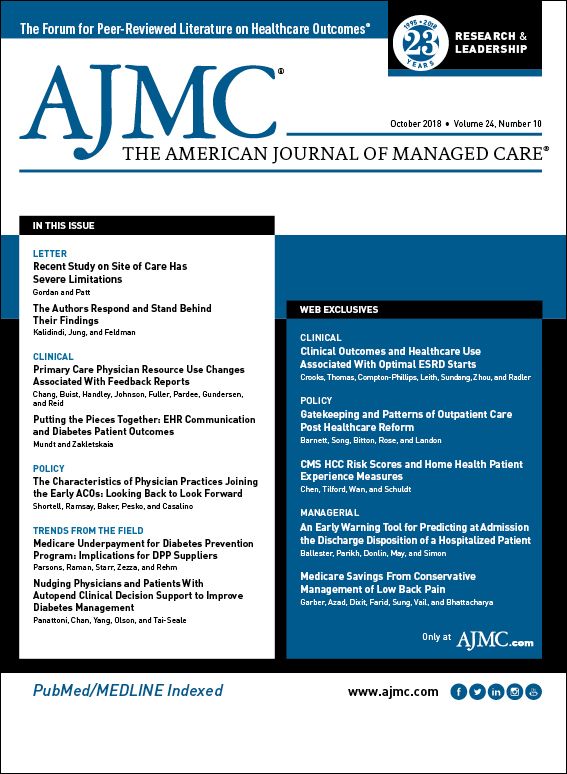
- Center on Health Equity & Access
- Clinical
- Health Care Cost
- Health Care Delivery
- Insurance
- Policy
- Technology
- Value-Based Care
The Authors Respond and Stand Behind Their Findings
Our study provides the first evidence on site-specific Medicare spending on chemotherapy adjusting for patient comorbid illnesses, cancer type, and other cancer-related risks.
Am J Manag Care. 2018;24(10):451It is unfortunate that the key approach and message of our article were not received by the authors of the letter. We use this opportunity to clarify our risk-adjustment methods and to discuss the importance of continuing work on the topic.
The primary aim of our research was to provide the first information on risk-adjusted spending and utilization of chemotherapy by care site in Medicare because most prior work on this topic examined the commercial sector. We focused on chemotherapy drugs and administration, so researchers will be aware of differences in site-specific chemotherapy use and costs between Medicare and commercial settings. Future studies can expand our analysis to include cancer services other than chemotherapy.
Regarding the risk-adjustment methods, we lacked information on cancer stage. This is a well-known limitation of claims data that also affected the Winn et al1 study of the commercial setting. However, we adjusted for a comprehensive set of risk factors, including indicators of comorbid illnesses that are common among chemotherapy users (eg, heart disease, diabetes, hypertension, depression, chronic pulmonary disease). Moreover, we used cancer-specific risk factors, including cancer metastasis, cancer type, and prior-year cancer-related utilization variables, which are strong predictors of chemotherapy service use and spending. The authors of the letter mentioned the Deyo-Charlson Index, which predicts general health outcomes, including mortality, as a possible adjuster. However, we believe that the cancer-specific risk factors we used are more appropriate and better adjusters for the analysis of chemotherapy services.
It is also surprising that the authors of the letter viewed our analysis of and adjustment for differences in the distribution of cancer types between hospital outpatient departments (HOPDs) and physician offices as a limitation of the study. Most prior comparisons of cancer costs between HOPDs and physician offices did not adjust for differences in cancer types by setting. We clearly pointed out those differences and discussed the importance of adjusting for them by showing how the results changed after adjustment. This is a main contribution and takeaway of our study.
For the facility fees in HOPDs, the Medicare outpatient prospective payment system rates for spending on chemotherapy administration in HOPDs include hospital facility fees.2-4 Thus, using the Medicare payment rate to calculate chemotherapy administration spending in HOPDs is appropriate and incorporates the facility fees.
Finally, differences in payments by site of care are relatively small in Medicare compared with the commercial sector. However, Medicare is an important payer for cancer-related services, being responsible for one-third of all cancer costs.5 Given Medicare’s role in cancer care, Medicare cancer costs are an important issue to analyze. We offered the first evidence on site-specific Medicare spending for chemotherapy agents and administration. As the site of care continues to shift from physician offices to HOPDs, chemotherapy costs and total cancer costs by site will continue to be important in both Medicare and commercial settings. We hope to see future studies that address this issue.Author Affiliations: Pennsylvania State University (YK, JJ), University Park, PA; University of Minnesota (RF), Minneapolis, MN.
Source of Funding: None; the original research was supported by NIH/NIA grant number 1R01AG047934-01 and NIH grant number R24 HD041025.
Author Disclosures: The authors report no relationship or financial interest with any entity that would pose a conflict of interest with the subject matter of this article.
Authorship Information: Concept and design (YK, RF); analysis and interpretation of data (RF); drafting of the manuscript (YK, JJ); critical revision of the manuscript for important intellectual content (JJ, RF); administrative, technical, or logistic support (YK, JJ); and supervision (JJ).
Address Correspondence to: Yamini Kalidindi, MHA, Department of Health Policy and Administration, Pennsylvania State University, 604 Ford Bldg, University Park, PA 16802. Email: ypk100@psu.edu.REFERENCES
1. Winn AN, Keating NL, Trogdon JG, Basch EM, Dusetzina SB. Spending by commercial insurers on chemotherapy based on site of care, 2004-2014. JAMA Oncol. 2018;4(4):580-581. doi: 10.1001/jamaoncol.2017.5544.
2. Guidi TU. Medicare’s Hospital Outpatient Prospective Payment System: OPPS 101 (part 2 of 2). J Oncol Pract. 2011;7(1):57-60. doi: 10.1200/JOP.2010.000191.
3. Chapter 3: hospital inpatient and outpatient services. In: Medicare Payment Advisory Commission. Report to the Congress: Medicare Payment Policy. Washington, DC: MedPAC; 2012:45-82.
4. Part B drugs payment systems. Medicare Payment Advisory Commission website. medpac.gov/docs/default-source/payment-basics/medpac_payment_basics_17_partb_final.pdf?sfvrsn=0. Published October 2017. Updated October 2017. Accessed August 22, 2018.
5. Total expenses and percent distribution for selected conditions by source of payment: United States, 2014. Agency for Healthcare Research and Quality website. meps.ahrq.gov/data_stats/tables_compendia_hh_interactive.jsp?_SERVICE=MEPSSocket0&_PROGRAM=MEPSPGM.TC.SAS&File=HCFY2014&Table=HCFY2014_CNDXP_D&_Debug=. Accessed August 22, 2018.

2 Commerce Drive
Cranbury, NJ 08512
AJMC®
All rights reserved.
